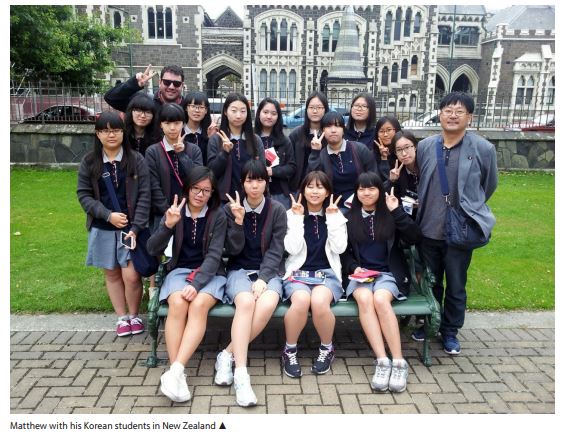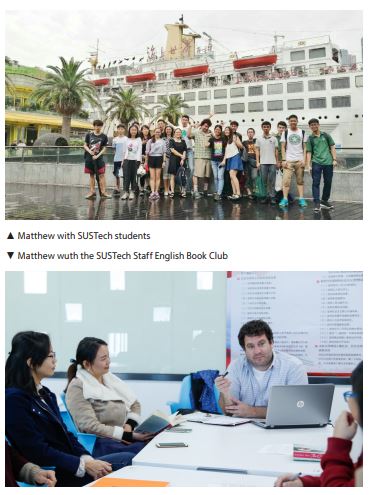My educational journey to SUSTech has taken me across the world, from the peaks of JiriSan in South Korea to the Great Rift Valley in Ethiopia. Along the way I have worked and taught with countless interesting people, including Nuns in Nonsan and Diplomats in Addis Ababa, each reflecting upon me the beauty of cultural diversity shared through the common language of learning.

During my undergraduate studies, I had the opportunity to travel, in 2007 and 2008 respectively, to Mexico to do cross-cultural educational research, once in Nogales and once in Oaxaca. In this land of a thousand stars, I studied migrant education, trying to understand the complexities surrounding the motives why people would leave their homelands in search of a better tomorrow, whether they be for economic, political, or scholastic reasons. I didn’t know then that I too, through this platform of global education, would follow along a similar path, leaving behind the comforts of California for the experiences which lied beyond that great blue Pacific Ocean.

In 2009 I moved overseas, leaving behind North America for my first stint in Asia, teaching English in South Korea. The Land of the Morning Calm welcomed me with a kindness I had never experienced before, called a foreigner in name only, while in reality I was treated as one of their own. The personal and professional relationships I established then I still rely upon now; a testament to the people of Korea and the warmth with which they nurtured me. It was while in Korea where I learned to understand the intersection of culture and acclimation, going on weekly adventures into the peninsula, trekking up national mountains or enjoying the warm hot springs. I simultaneously fell in love with the metropolis of Seoul while at the same time found solace in the villages of Chungcheongnam-Do, each offering me a new element of life breathed in with that fiery Soju. I remained in front of classes delivering lectures, but the truth is that I became a student of Korea, embracing its rich history while simultaneously standing in amazement at its boundless future. The sleepy suburbs of Orange County or the placated cities like Portland couldn’t compare to the speed which I saw in Korea, a new vision I was witnessing through lenses I had never tried on before, but which I found, fit me perfectly.
One of the interesting things about living overseas is that it goes to redefine your perception of home, able to view it from a different perspective. It was by providence through which I ended up in Korea; an uneasy sense of restlessness growing inside me while I lived in the United States, which somehow manifested itself through applying to jobs in a country I knew little about. Yet looking back on that decision, it was perhaps the single most important one of my life, encouraged from a young age by my parents to travel, and still supported by them to continue chasing my dreams, wherever they may lead. My move to Korea increased my professional development, but perhaps more importantly, it expanded my worldview. It was during my five years in Korea where I began to earnestly write, sharing my experiences through travel articles and getting more serious academic-based pieces published in local magazines and newspapers, something I continue to do now, nearly a decade later in China. The words I transcribed seemed to flow effortlessly as they were mere reflections of my thoughts, then as now, positive experiences from these magical places. On long weekends I would fly to cities such as Cebu, Bali or even Vladivostok, incessant in my desire to see as many countries as possible, finding beauty in the absurd, and satisfaction in the delicious. The contrasting cultures of Asia mesmerized me, from the clothes to the faiths and from the music to the foods, each one unique in its own individuality, writing their own stories of which I simply played a part. Yet upon each return flight to Incheon Airport, I never felt any remorse, as I was coming home to a Korea which continued to be new to me, whimsical in its eccentricities and sometimes absurd in its distinctiveness. It’s what kept me there for five years and why when it came time, it was so difficult to leave.

After enough memories to last a lifetime from my experiences in Asia, I wanted to challenge myself both personally and professionally, looking for a new opportunity which was as unique as I was. Complacency can subtly disrupt ambition and I wanted to be careful to follow up my growth in Korea with something that tested my resolve as an individual and as a teacher. Applying to a competitive program, I was accepted as an English Language Fellow, working on behalf of the US Embassy in Ethiopia for a two-year program which placed me at universities across the country, teaching English to students and Methodology and Pedagogy to teachers. The single greatest “experience” of my life, while at the same time being the most difficult thing I have ever done, those two years in Ethiopia taught me more about myself than I could have ever anticipated. Yet like the people I met in Korea, the kindness of the Ethiopians knew no bounds, welcoming me into their communities with open arms and warm hearts.
Within an Ethiopian educational context, I quickly discovered that learning outside of the classroom seemed to have a longer lasting impact on the students. While we met weekly for our prescribed classes, it was our trips to Gender Empowerment Art Exhibitions, Sports through Diplomacy Programs, and Poetry Workshops which meant more to these students, most of whom were the first in their families to receive a tertiary education. I was the first foreigner they had ever had as a teacher, and I felt that it was my responsibly to not only teach them English but to expand their cultural awareness as well, giving them ownership over their future and options from which to choose their direction. By all accounts, Ethiopia is a developing nation, and my role there as a Fellow was to instill notions of pride, empowerment and ambition into the minds of the students and teachers I worked with. These practices in turn taught me not only about the context I was working in, but also the context from which I came.
An advantage to working overseas is that I get to experience opportunities which would be hard to come by if I was teaching in a California school district. In Ethiopia, these were manifested through outreach I did with local communities, including volunteer teaching at a Mosque school, organizing a $500,000 book donation to my university, and bringing my students to see President Obama speak at the African Union. While my teaching contract stipulated that I teach 20 hours a week in the classroom, I was able to excel because I quickly learned that true education takes place outside the confines of campus, where reality shows both sides of its nature. For my students, these opportunities gave them sustainable learning experiences which will last long after I have moved on and provided them with the tools to build a future in which they can continue to help lead their country.
During my two years in Africa, the Asian countries I used to travel to were replaced by trips to Djibouti, Kenya and Burkina Faso, each of which I was able to present at international conferences, highlighting my work in Ethiopia from a socio-linguistic perspective. Yet it was at the 2016 TESOL (Teaching English to Speakers of Other Languages) Conference in the United States, presenting on Gender Identity in an Ethiopian Context where my road to SUSTech was paved. This preeminent conference in our field had attracted the Center for Language Education (CLE), and I decided to sit down for an interview, explaining myself and my viewpoints on teaching. With a return flight to Africa to finish my Fellowship, a future in Asia was once again dancing around in my head, interested to find out more about not only SUSTech, but Shenzhen.

As part of an Embassy program, two years was the maximum time I could spend in Ethiopia, so I agreed to come to China, excited about a new opportunity in a country I had only visited once on vacation (Beijing, 2010). I arrived at SUSTech in the Fall of 2016, and in the time since, have once again been welcomed by a student body and administration which wants to learn, while at the same time, is happy to share knowledge. Teaching both students and staff, I have tried to instill many of the lessons I learned while living in Korea and Ethiopia, from authentic learning in the classroom to extended opportunities outside of campus. Over the course of nearly two years, I have worked with students in the English-Speaking Club and also started a Staff English Book Club, both examples of education which doesn’t have to be from a prescribed format. Similarly, I have been honored to work on International Student recruitment, a firm believer that multiculturalism in the classroom is a benefit to all; broadening the scope of dialogue which can take place and strengthening the bonds between differing ideas.
I continue to write about my experiences, having numerous articles printed in the local English newspaper, The Shenzhen Daily, highlighting the work I am doing at SUSTech, and even helped one of my Sophomore students get an article published as well. Traveling remains an important aspect of my time abroad, visiting Malaysia, Cambodia and Singapore since arriving in Shenzhen, cognizant that Asia is multifaceted, with each country a piece of a complex puzzle. The conversations I have and the lessons I give are a reflection not of me as an American, rather as a global educator, combining my experiences from across the globe and transmitting them through a platform of inclusion, including aspects from China, too. The direction which SUSTech is on is one of rapid transformation into one of the leading research universities in the world, and I am privileged to be a part of the process. It is my hope that through my teaching I am able to instill in this community of learners the knowledge necessary for a successful future in which they get to make decisions which will, quite literally, affect the world. I am grateful to be able to share my story here, for as long as it may seem, is only one small chapter of my life, complex as it is interesting. The conflux of teaching and travel has given me these opportunities and continued to remind me that Education is Lifelong and Worldwide!
Proofread ByFan Yining
Photo ByScientia